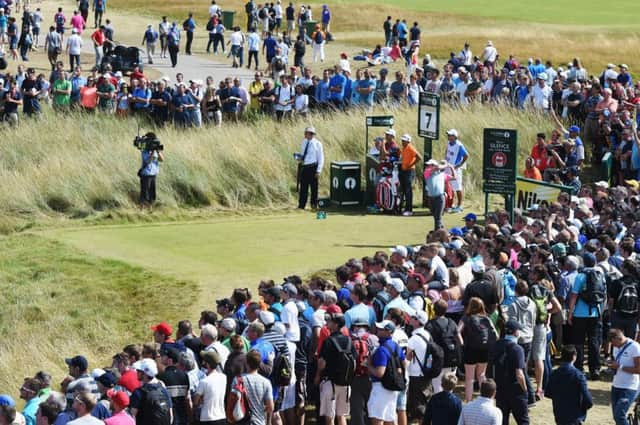The Open: History beckons for Rory McIlroy


As Woods, 38, slipped out of Royal Liverpool to reflect on another frustrating major, Rory McIlroy, 25, was taking centre stage at the Open Championship, flash bulbs popping as he added the Claret Jug to a collection of trophies that already includes the US Open and the PGA Championship. It felt for all the world like a changing of the guard.
Woods has triumphed in 11 more majors than McIlroy, but it is six years since his last one, and his prospects of matching, let alone beating, the 18 won by Jack Nicklaus appear to be receding. As the American stalls in his quest to become the greatest player who ever lived, the young Northern Irishman’s attempt to rewrite the history books gathers momentum.
Advertisement
Hide AdAdvertisement
Hide AdHis victory at Hoylake represents the third leg of what would be a career Grand Slam. He is now just a Masters victory away from the clean sweep that has been achieved only by Nicklaus, Woods, Ben Hogan, Gary Player and Gene Sarazen. If there is any lingering doubt as to the significance of his progress, it should be noted that only two other players – Woods and Nicklaus – have won three majors by the same age.
Comparing him with Woods is not to say that McIlroy will win 14 major titles, only that he has the potential to do so. There are so many similarities with the American that it would be folly to pretend otherwise. Take, for instance, the way each was identified as a child prodigy. Why else would Rory’s father, Gerry, a barman ten years ago, have bet £100 on his son winning The Open within a decade?
Then there is the television stardom that each enjoyed before he was old enough to understand it. Woods, aged two, joined Bob Hope on the Mike Douglas Show. In Ireland, it was The Kelly Show that had McIlroy, aged eight, chipping balls into a washing machine, which was the practice routine in his Holywood home.
Their shared ability to overpower a golf course is uncanny. So frightening was the distance Woods hit the ball in his early days, they took to lengthening – or “Tiger-proofing” – venues across the world. At Hoylake, McIlroy was among the longest drivers, making his key move on Saturday afternoon, with two eagles in his last three holes.
Both have emerged from difficult times. Just as Woods sacked his agent in the early years, a period when he sacrificed results to rebuild his swing, so has McIlroy already seen off a slump or two. In 2012, when he missed the cut at his defence of the US Open, his relationship with Caroline Wozniacki was reported to be a distraction. He, too, has had his problems with management teams. And who can forget his final-round collapse at the 2011 Masters, which might have destroyed a weaker character?
Tom Watson, winner of eight majors, suggested yesterday that the seeds of greatness are sown in adversity. “He’s gone through a struggle with his golf game over a period of time,” said the American. “And now it seems like he’s got it back. You learn a lot from your failures. You come back stronger if you fail. I know it was a burden on him. The frustration was there.
“All golfers feel the same frustration. We practise as hard as we possibly can and nothing happens. Then finally, all of a sudden, the light switch will turn on, something will make a change in your golf swing, and it gets easy. That’s what happened to me many times in my career, and it seems like it’s happened to Rory.”
McIlroy has the game to dominate major championships in a way that only Woods has done in the modern age. He didn’t run away with it yesterday, but he could have done. Each of his two previous major titles was won by eight shots, prompting comparisons with the 1997 Masters and the 2000 US Open, which Woods won by 12 and 15 strokes respectively.
Advertisement
Hide AdAdvertisement
Hide Ad“The way he plays is pretty aggressive,” said Woods yesterday. “When he gets it going, he gets it going. When it gets going bad, it gets going real bad. It’s one or the other. If you look at his results, he’s kind of that way. Very similar to what Phil [Mickelson] does. He has his hot weeks and he has his weeks where he’s off. And that’s just the nature of how he plays the game. It’s no right way or wrong way. It’s just the nature of how he plays.”
The problem is that his adventurous streak does not lend itself to consistency, which is perhaps a quality he lacks in pursuit of more majors. How many can he win? How big is his desire to be more than just a multiple major winner? How will he deal with the setbacks that are bound to come his way as the rest of his career unfolds?
Whether he is willing to sacrifice quite so much as Woods remains to be seen. For the time being, he is reassuringly normal, which is probably not a quality associated with greatness. To be special, by definition, requires a certain eccentricity.
After the implosion at Augusta three years ago, Padraig Harrington raised a few eyebrows by saying that McIlroy could go on to win more majors than Nicklaus. His achievements since, culminating in yesterday’s success at Royal Liverpool, have done nothing to diminish that possibility.
Whether it happens is another matter. McIlroy is now the next Tiger Woods, which is not to say that he will win 18 majors, 14 majors, or even another handful. It is to say only that he is the player, more than any other of his generation, with the gifts to give it a try.